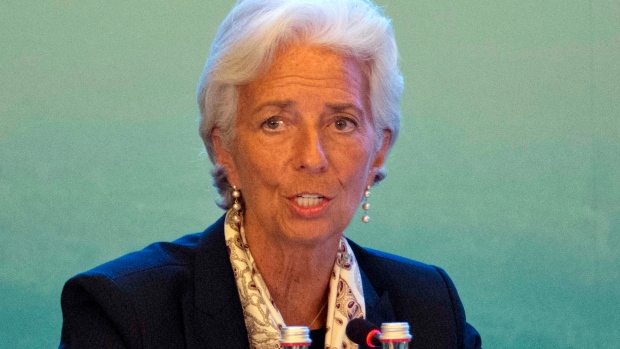Sep 1, 2016
IMF's Christine Lagarde says global growth outlook likely will be cut as trade wanes
, Reuters

International Monetary Fund Managing Director Christine Lagarde said the institution will likely downgrade its 2016 global growth forecast again as economic prospects are dimmed by weak demand, flagging trade and investment and growing inequality.
Lagarde told Reuters in an interview that G20 leaders need to do far more to spur demand, bolster the case for trade and globalization, and fight inequality.
And while some major threats to the global economy have yet to materialize, such as recession sparked by Britain's vote to leave the European Union or a collapse in Chinese growth, she described the overall outlook as "slightly declining growth, fragile, weak and certainly not fueled by trade."
"You could argue that Brexit is not really delivering the massive crisis that we had expected, you could argue that the Chinese transition is proceeding reasonably well, and you could argue that low commodity prices have gone up a little bit," Lagarde said. "So this is on the surface."
"However, when you look deep down at the economic growth prospects, at the growth potential, at the productivity, we are not getting very good signals, and we will probably be revising down our forecast for growth in 2016."
The IMF is due to revise its World Economic Outlook forecasts in early October ahead of its annual meetings. Another cut would be the sixth straight growth markdown in about 18 months.
Citing global uncertainty over the June 23 Brexit vote, the IMF in July cut global GDP growth estimates to 3.1 per cent for 2016 and 3.4 per cent for 2017 - down about a tenth of a point for each year.
The full economic impact of the Brexit crisis will probably not be fully known until 2017, when more will become apparent about the shape of the future U.K.-EU relationship, Lagarde said. But she noted that Britons' wealth has already been eroded by a 15 per cent decline in the pound's value, and that U.K. consumer and business confidence data was weak.
Lagarde said she will tell G20 leaders on Sunday and Monday in Hangzhou, China that further reductions in growth potential and more obstacles to the free movement of goods, services, capital and people would hurt all of them. She said people harmed by trade and innovation need to be helped by policies to allow them to retrain and acquire new skills and job mobility.
"This is something that all countries and all governments should be concerned and mobilized about," Lagarde said.
The IMF said in a briefing note to G20 leaders that falling trade volumes have contributed to lower GDP growth and urged them to make a stronger case for the benefits of trade.
EGYPT LOAN DEAL
Lagarde said she would be spending the next several days speaking with senior officials in a number of countries to persuade them to contribute to about US$5 billion to US$6 billion in bilateral financing to support Egypt. The funds are needed to allow a US$12 billion IMF loan program to be approved by the Fund's board.
"The fact that Egypt has now reached an agreement with the IMF is an indication that they are taking their economic restructuring, their economic objectives seriously, and that should encourage either friendly neighboring countries or other bilateral partners to actually participate in the funding," she said.
While this is likely to include Middle Eastern and Gulf states that have historically supported Egypt, it also may include other countries that "are willing to chip in" to help Egypt reach its considerable economic potential.
GREECE, FRENCH COURT CASE
Lagarde also said she was encouraged by Greece's recent privatization efforts and was hopeful that reform legislation would soon be passed and implemented. But the IMF is still not ready to participate in the latest version of Greece's bailout.
"We are not party to the program because I have said repeatedly that the program has to walk on two legs. One, there has to be significant reforms and second there has to be a debt that is sustainable by our standards and our measurements and this at this point in time is not the case," Lagarde added.
Lagarde also said that her upcoming trial in France over a 400 million euro (US$448 million) state payout to businessman Bernard Tapie would not be a distraction to her management of the IMF.
France's highest appeals court ruled in July that Lagarde should stand trial for negligence in the use of public funds for her role in seeking an out-of-court arbitration settlement for Tapie in 2008, when she was France's finance minister.
The IMF board has expressed confidence in her ability to effectively lead the institution, and Lagarde's lawyers have insisted that she acted in the best interests of the French state and in full compliance with the law.
"I draw a lot of strength and determination from the very strong support from the board," Lagarde said. "And I rely on good and solid lawyers who have to do their jobs, so it's not a distraction for me. I focus my energy and time on the mission of the IMF and what I have to do to serve that mission."

